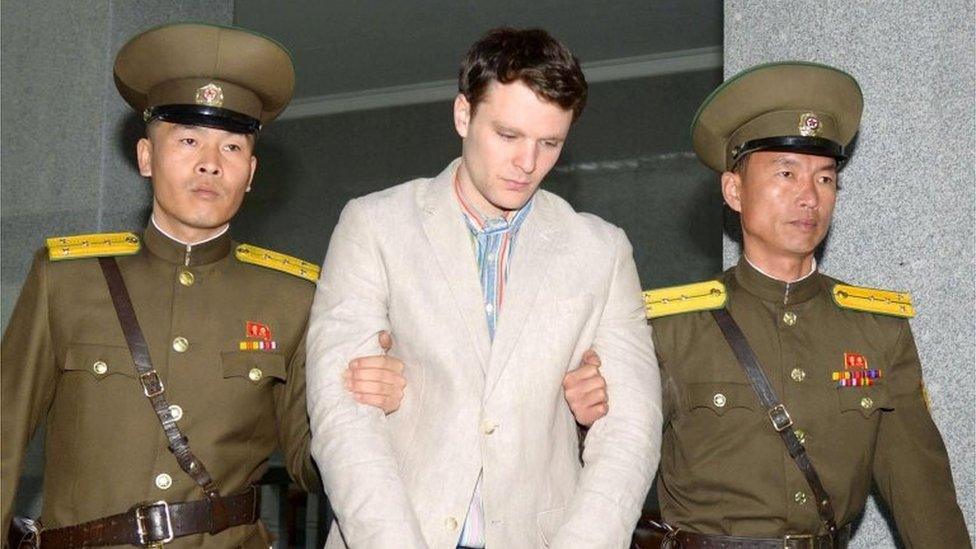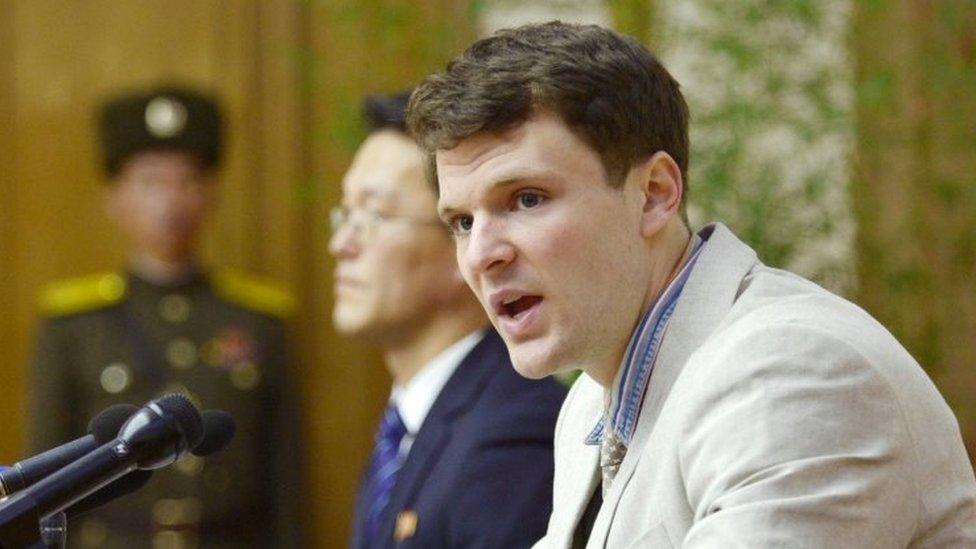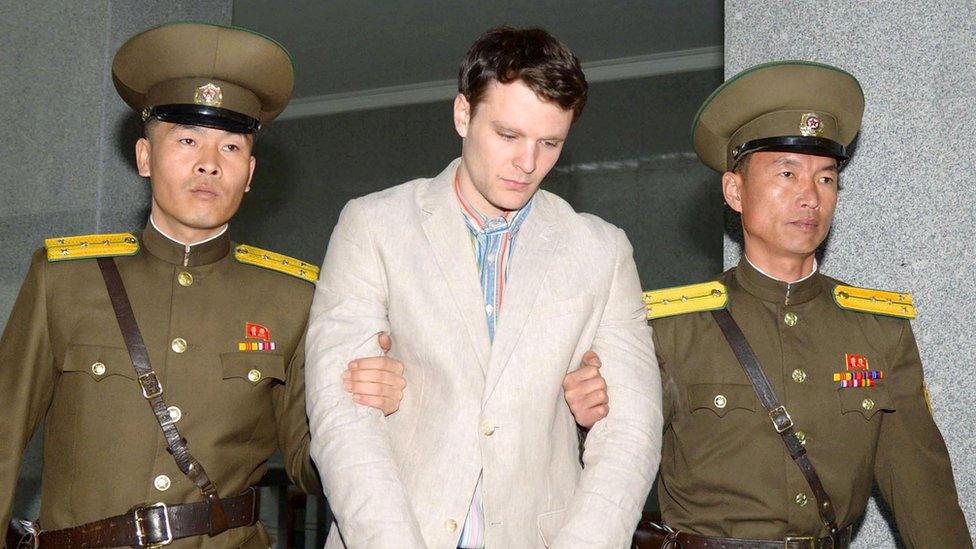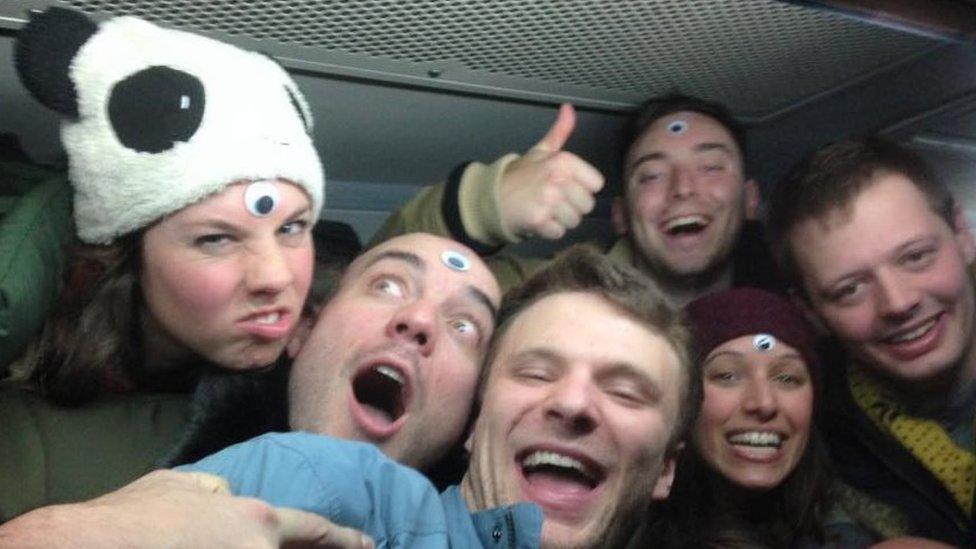Otto Warmbier: US student sent home from North Korea dies
- Published

Otto Warmbier's parents say they went 15 months without hearing from or about their son
The US student held in captivity for more than 15 months in North Korea has died a week after returning home.
Otto Warmbier, 22, was serving 15 years hard labour, accused of attempting to steal a propaganda sign from a hotel.
He was returned to the US last Tuesday, with North Korea saying it was on humanitarian grounds.
North Korea said he had been in a coma for a year after contracting botulism but his family say he was subjected to "awful torturous mistreatment".
A team of US doctors have also disputed North Korea's version of events.
Donald Trump says the US will 'handle' North Korea
Mr Warmbier had suffered severe brain damage, and was medically evacuated from North Korea on 13 June to a hospital in his home city of Cincinnati, Ohio. It is unclear how he fell ill.
A statement from the family on Monday said: "It is our sad duty to report that our son, Otto Warmbier, has completed his journey home. Surrounded by his loving family, Otto died today at 2:20pm."
They said the student had been "unable to speak, unable to see and unable to react to verbal commands".

Otto appeared in a news conference in 2016 confessing to stealing the sign
"The awful torturous mistreatment our son received at the hands of the North Koreans ensured that no other outcome was possible beyond the sad one we experienced today."

Timeline of events
30 Dec 2015 - Mr Warmbier travels from Beijing to Pyongyang with a tour group.
2 Jan 2016 - He is arrested at Pyongyang International Airport as he tries to leave the country. Later that month, North Korea announces it is holding Mr Warmbier for a "hostile act".
16 March 2016 - Mr Warmbier goes on trial in Pyongyang where he confesses to stealing a propaganda poster, and is sentenced to 15 years of hard labour. He is believed to have slipped into a coma shortly after his trial.
Early June 2017 - US officials and Mr Warmbier's parents are told about his condition
13 June 2017 -He is released from North Korea and medically evacuated to the US. Doctors say he has suffered a severe brain injury.
19 June 2017 - Mr Warmbier dies.

The economics student from the University of Virginia had travelled to North Korea as a tourist.
A month after his arrest, he appeared at a news conference tearfully confessing to trying to take a sign from his hotel as a "trophy" for a US church.
"The aim of my task was to harm the motivation and work ethic of the Korean people," he said.
Foreign detainees in North Korea have previously recanted confessions, saying they were made under pressure.
The company Mr Warmbier travelled with, China-based company Young Pioneer Tours, has announced it will no longer take visitors from the US to the country.
"The way his detention was handled was appalling and a tragedy like this must never be repeated," it said in a statement.
"Despite constant requests, we were denied any opportunity to meet him or anyone in contact with him in Pyongyang, only receiving assurances that he was fine."
'No sign of botulism'
North Korea said last week that it had released Mr Warmbier "on humanitarian grounds".
Shortly before he was freed, his parents told the Washington Post newspaper they had been informed by the North Korean authorities that their son had contracted botulism, a rare illness that causes paralysis, soon after his trial.
He was given a sleeping pill and had been in a coma ever since, the newspaper said.
Otto Warmbier's father, wearing his son's jacket, told reporters last week his son had been treated "brutally"
But a team of doctors assessing him in Cincinnati said they had found "no sign of botulism".
Doctors confirmed that there was no sign he had been physically abused during his detention, based on scans.
They believe respiratory arrest led to his condition, which is caused by a lack of oxygen and blood in the brain.
President Donald Trump said Mr Warmbier's death had deepened his administration's resolve "to prevent such tragedies from befalling innocent people at the hands of regimes that do not respect the rule of law or basic human decency".
"The United States once again condemns the brutality of the North Korean regime as we mourn its latest victim," the presidential statement added.
- Published14 June 2017

- Published20 June 2017
